Research
Research Promotion and Management Office
- Room 1214, 2 Floor, Building 1
- +66 (2)700 5000 #1423, 1425
- Mon – Fri 8:00 am – 5:00 pm
Research Clusters
August 19, 2021 2024-08-06 3:02Research Clusters
Research Clusters
Technology, Public Policy and Sustainability Cluster
Cluster projects research the role of emerging technologies in its potential for societal and business innovations and disruptions in regard to sustainable development. The main objective of this cluster is to inform feasible and desirable policy formulations aiming for sustainable development.
Cluster Manager Assoc. Prof. Dr. Roman Meinhold,email: roman.mei@mahidol.edu
Cluster Members
- Assoc. Prof. Dr. Alessandro Stasi, Business Administration Division
- Assoc. Prof. Bablu Kumar Dhar, Business Administration Division
- Dr. Christoph Wagner, Research Fellow, Chair of Business Ethics, University Hohenheim, Stuttgart, Germany
- Assoc. Prof. Dr. Claus Schreier, Business Administration Division
- Dr. David Tan, Adjunct Professor, Business Administration Division
- Dr. Giovanni Frigo, Research Group Philosophy of Engineering, Technology Assessment & Science (PhilETAS), Institute for Technology Assessment and Systems Analysis (ITAS), Karlsruhe Institute of Technology (KIT), Germany
- Asst. Prof. Dr. Isabel Pereira Rodrigues, Business Administration Division
- Assoc. Prof. Dr. Roman Meinhold, Business Administration Division
Sub-projects
Sub-project I: The Upper Mahakam Region in Central Borneo: Culture, Society and Development in a Frontier Region
Sub-project I:
The Upper Mahakam Region in Central Borneo: Culture, Society and Development in a Frontier Region
Christian Oesterheld / Bernard Sellato / Jesper Döpping
Being one of the latest regions to obtain the status of ‘regency’ (kabupaten) within Indonesia’s decentralization process, the upper Mahakam (Mahakam Ulu) is situated in the north-western corner of East Kalimantan province, right at the heart of Borneo – a dynamic frontier space with borders to the Malaysian territory of Sarawak and to the provinces of North, Central and West Kalimantan. The area was amongst the last to be added to the Dutch colonial possessions in the East Indies and had remained terra incognita until the late 19th century, allowing for the development of a distinct regional identity in an ethnically diverse setting.
This cross-disciplinary research project investigates processes of socio-cultural and socio-economic change in connection to the “transformation of marginal space into frontier zone” (Cons and Eilenberg 2019), focusing on the “assemblage” character of such spatial and temporal zones of convergence. As such the project connects historical and contemporary perspectives when engaging with the process of the area’s (re)frontierization dynamics. We address the question of how frontiers are made at specific moments in history and discuss the lifecycle of such frontierization – as well as the frontier’s “afterlife”: the occasional reemergence of a geographic area as a frontier. We are also interested in vestiges of “frontier heritage” that emerge when frontiers disappear: public memory, social adjustments, economic adaptation or legacies of political suzerainty.
The project has initiated a loose cooperation with the government of Mahakam Ulu Regency, which is currently in the process of formalization. Our international team of researchers also cooperates with local scholars in East Kalimantan to foster a collaborative network of exchange and mutual inspiration.
Recent Project Publications:
Christian Oesterheld
A Past for the Future: Frontier Heritage on the Upper Mahakam (East Kalimantan, Indonesia)
This article reviews historical processes of frontier-making (and re-making) in a region of central Borneo that was and still is on the margins of state control. Contributing to discussions about the ‘assemblage’ character of frontiers as zones of the ‘not yet’, this case study demonstrates how complex and eclectic historical legacies have gone on to produce a palimpsest of experiences and public memories that are currently being rein scribed in the context of ‘frontierisation in the second degree’. This ‘afterlife’ of the historical frontier zone is discussed in relation to its significance for competing visions of regional identity-building and claims of political suzerainty.
Sub-project II: Frontier Communities: The Kuomintang Villages in Northern Thailand
Frontier Communities: The Kuomintang Villages in Northern Thailand
Hardina Ohlendorf/Barbara Ekamp
This project seeks to examine the so-called Kuomintang (KMT) villages in Northern Thailand through the theoretical lens of ‘frontier community’. Frontier in this case is understood in several dimensions: 1. As a political frontier, where different claims of statehood and national belonging intersect and overlap, namely those of Thailand, the People’s Republic of China, the Republic of China, and Taiwan. 2. As a socio-economic frontier where expanding forces of crop cultivation, forest preservation and global tourism interact. 3. As a spatial frontier, where investment, infrastructures and personal networks from China and Taiwan intersperse and occasionally fragment Thai national territory. 4. As a cultural frontier, where contesting memories, diverse languages and religious faiths meet. Employing Appadurai’s (2001) concept of process geography, this project conceives of the KMT villages not as areas with well-defined limits and lines, but rather as places with a social life, as localities that are constantly produced and re-configured through the flows of people, goods and ideas. Relying on semiotics, interviews and archival research, this project seeks to shed light on identity constructions of the KMT villages in the current period by examining perceptions of the Chinese, Taiwanese, and the Thai state by KMT villagers, generational dynamics in self-identification and senses of belonging, the impact of tourism on identity constructions in KMT villages as well as discourses on the KMT villagers in contemporary China and Taiwan. This project aims to advance our understanding of overseas Chinese networks in Southeast Asia, and, in a wider sense, seeks to contribute to discussions of the role of ‘place’ for identity formations in frontier zones and spaces. The research is expected to shed some light on how not just issues of “national belonging”, but also intercultural and interethnic interactions shape cultural identities and senses of citizenship. It thus aims at contributing to a better understanding of processes of migration and integration in the contemporary period.

